3 Emotions You Hate Being Around, Based On Your Myers-Briggs® Personality Type
Have you ever found yourself wrestling with certain emotions—maybe anger, shame, or just that heavy cloud of pessimism? Well, you’re not alone. I recently conducted a survey that got over 5,000 responses from readers, followers, and clients. In it, I asked the question: “Which 1-3 emotions do you find the most difficult to deal with in others?” Today we’re diving into the results, and I think some of them will surprise you!
Here are the choices respondents could choose from in the survey:

- Shame
- Anxiety
- Joy
- Contentment
- Restlessness
- Disgust
- Confusion
- Gratitude
- Envy
- Hopefulness
- Anger
- Optimism
- Pessimism
- Pride
- Sadness
- Fear
- Excitement
- Boredom
- Disappointment
Every Myers-Briggs® type has a unique approach to life, so naturally, each one had its own top three “emotional challenges” they find particularly hard to handle in others. Let’s get started!
Not sure what your personality type is? Take our new personality questionnaire here. Or you can take the official MBTI® here.
The 3 Emotions You Hate, Based On Your Myers-Briggs® Personality Type
Table of contents
- The 3 Emotions You Hate, Based On Your Myers-Briggs® Personality Type
- ISTJ – Anger, Pride, Pessimism
- ISFJ – Anger, Pessimism, Pride
- ESTJ – Pessimism, Anxiety, Boredom
- ESFJ – Anger, Pessimism, Shame
- INTJ – Anger, Pessimism, Envy
- INFJ – Anger, Pessimism, Pride
- ENTJ – Pessimism, Envy, Disgust
- ENFJ – Pessimism, Anger, Pride
- ISTP -Anxiety, Anger, Pessimism
- ISFP – Anger, Pessimism, Disgust
- ESTP – Anxiety, Pessimism, Sadness
- ESFP – Anger, Pessimism, Envy
- INTP – Anger, Anxiety, Envy
- INFP – Anger, Pessimism, Envy
- ENTP – Pessimism, Anger, Anxiety
- ENFP – Pessimism, Anger, Envy
- What Do You Think?
ISTJ – Anger, Pride, Pessimism
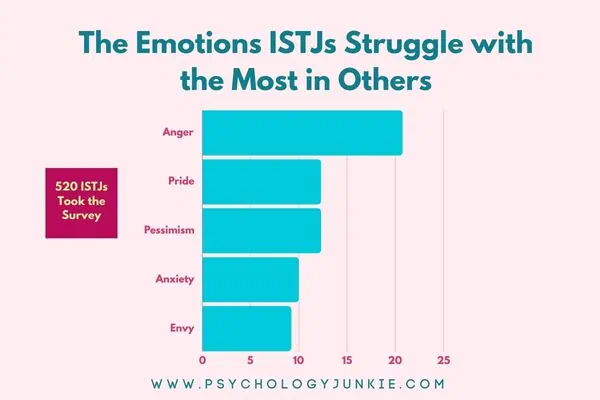
ISTJs taking the survey had the most negative feelings towards anger. Calm and composed, they tend to keep a cool expression even when they’re feeling furious inside. 20.77% of the ISTJs surveyed said anger was one of the three emotions they struggled with most in others.
Pride and pessimism tied for second place, with both having 12.31% of the votes. Showiness, attention-seeking, and having “main character syndrome” seems cringe-worthy to ISTJs who believe in being dutiful without asking for a lot of fanfare in the process. And then there’s pessimism: Sure, ISTJs can have their pessimistic moments, but they believe on meeting pessimism with action and hard work rather than wallowing. When people wallow it can throw them off and make them feel irritated that no progress is being made.
In third place came anxiety. Sadly, this is an emotion that ISTJs struggle with themselves, but this doesn’t mean they like dealing with it in others. When ISTJs are interacting with people they tend to rely on the tough, can-do, logical side of their personality. Often they keep their own worries private, sharing them with only a select few. When other people are anxious, ISTJs will try to find solutions or make plans, but it can quickly exhaust them.
Find out more about ISTJs: 30 Amazing Fictional ISTJ Characters
ISFJ – Anger, Pessimism, Pride
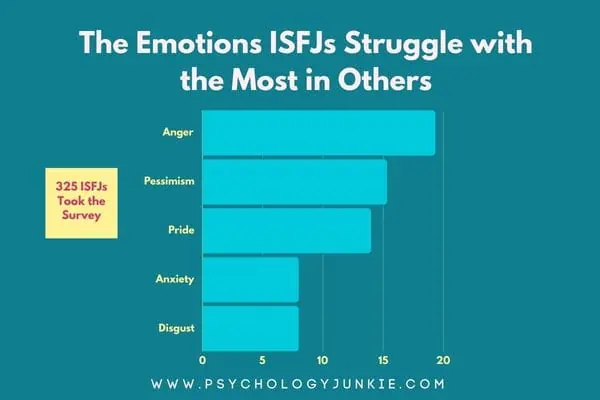
For ISFJs, anger ranked as the most challenging emotion to deal with in others, with 19.33% of ISFJs marking it as one of their top struggles. Known for their steady, caring presence, ISFJs often prefer to keep things calm and supportive. When others are angry, it can feel disruptive to the harmony they work so hard to maintain.
Pessimism followed closely, with 15.33% listing it as a difficulty. While ISFJs may have their own moments of self-doubt, they tend to focus on creating a positive environment and helping others feel reassured. Constant negativity can feel like a drain on their compassionate energy, especially when it prevents progress.
In third place was pride, with 14%. ISFJs tend to work quietly behind the scenes, even eschewing a lot of attention and limelight. As a result, displays of excessive pride or attention-seeking behaviors can feel uncomfortable. For them, actions speak louder than words, and they’re more focused on meaningful effort than recognition.
ESTJ – Pessimism, Anxiety, Boredom
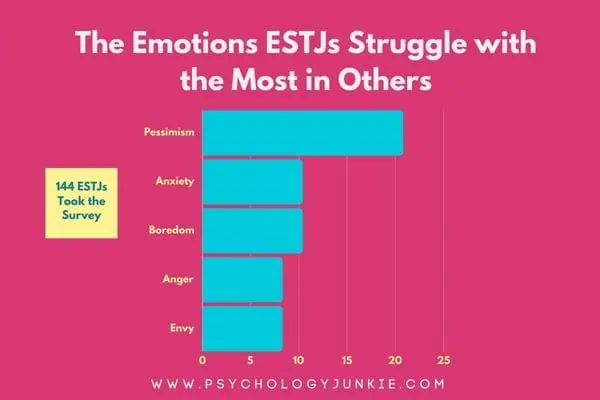
For ESTJs, there’s nothing quite as frustrating as pessimism. ESTJs are practical, get-it-done types, always looking for the next solution, the next move forward. So, when they encounter someone who’s stuck in a cycle of negativity, it feels like an unnecessary roadblock. This is likely why 20.83% of ESTJs voted for this as their most annoying emotion in others.
Anxiety is another emotion that can throw ESTJs off, and 10.42% voted for it. They’re wired to approach life with action and objectivity. Worrying feels pointless to them; like rocking in a rocking chair when you’re really supposed to be running in a race. This doesn’t mean they never worry; ESTJs are human, after all. But they tend to quickly convert their anxiety into output, fixing and finding solutions. ESTJs might try offering advice or laying out action steps, only to feel stymied when those solutions don’t ease the anxious person’s mind.
And then, there’s boredom, also with 10.42% of the votes. I’ve known two ESTJ mothers who would say to their kids, “If you’re bored, I’ll give you something to do.” This quickly made their children stop using that complaint, because there was always a list of unpleasant chores to do when boredom reared its ugly head. ESTJs don’t just sit around waiting for things to happen; they make things happen. When forced to wait, they’re often the ones organizing, planning, and finding ways to keep moving. For ESTJs, boredom is an invitation to get creative—or to completely reorganize the garage.
ESFJ – Anger, Pessimism, Shame
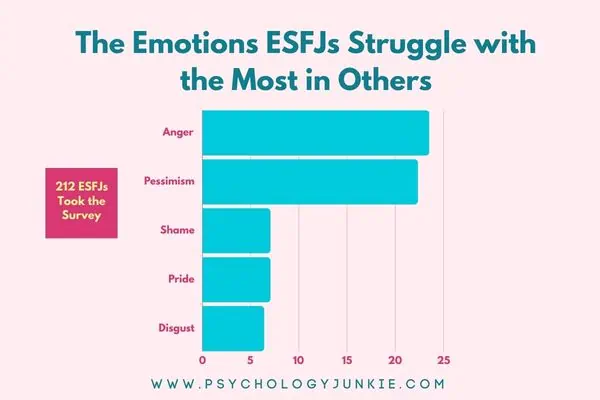
Anger tops the list for ESFJs, with 23.53% of them identifying it as their most difficult emotion to handle in others. They tend to like good vibes and harmonious connections, and anger is like the lightning bolt that destroys the party. That said, they can become reproachful and disapproving when others are acting in a way that seems inappropriate to them.
Close behind is pessimism, with 22.35% voting for it as a major frustration. ESFJs want to bring people up and lift their spirits, so constant negativity can feel like trying to water a garden during a drought—it just doesn’t quite work.
Then we have shame, at 7.06%. ESFJs are empathetic by nature, and they often feel others’ emotions deeply. When someone is weighed down by shame, ESFJs might even feel it alongside them, wishing they could take that burden off their shoulders. Many ESFJs report getting “second-hand embarrassment,” even avoiding embarrassing movies because it’s too overwhelming for them.
INTJ – Anger, Pessimism, Envy
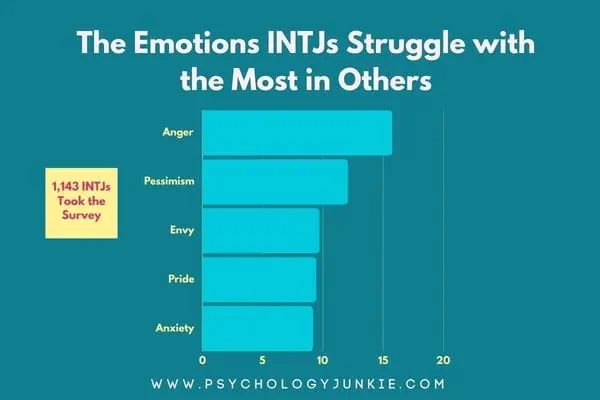
For INTJs, anger leads the list, with 15.75% finding it the most challenging emotion in others. INTJs value rationality and control, so when people lose their tempers, it feels disruptive, almost like a glitch in the system. They’d prefer to step back, analyze, and find a solution rather than deal with a heated outburst.
Next, we have pessimism at 12.07%. INTJs are realists, but they don’t see much value in dwelling on the negatives. When others get stuck in a pessimistic cycle, INTJs can feel it saps the energy out of constructive planning and problem-solving. They’d much rather focus on potential solutions and future possibilities than get bogged down by what’s wrong.
Then there’s envy, with 9.71% marking it as challenging. INTJs set their own goals and standards, so when others obsess over comparisons or jealousy, it feels unnecessary and counterproductive to them. They strive for autonomy and focus on self-improvement, preferring to keep their eyes on their own progress rather than someone else’s achievements.
Find out more about INTJs: INTJs and Relationships with Other Personality Types
INFJ – Anger, Pessimism, Pride
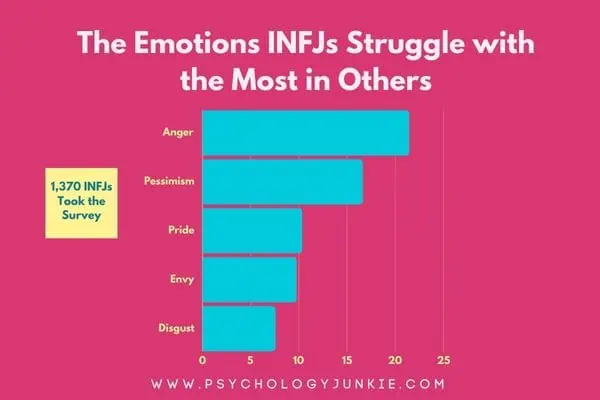
INFJs disliking anger comes as no surprise. These types hate conflict and work especially hard to keep relationships in a positive, harmonious place. 21.46% of INFJs listed this as one of their most difficult emotions to deal with in others. Empathic and understanding, they tend to avoid losing their cool at all costs. So when someone’s angry, it can feel like immature, overwhelming, and even insulting. INFJs will try to understand the source of the anger, but it can be exhausting if the anger feels directed or prolonged.
Pessimism follows closely at 16.64%. INFJs are often idealistic, holding a vision for what life and relationships could be. When people dwell on negativity, it can feel draining to their sense of hope and purpose. INFJs are more likely to want to talk about ways to overcome obstacles, a future someone could work towards, or an ideal to strive for.
Finally, pride came in third with 10.36% of INFJs mentioning it as something they detest. INFJs tend to be self-effacing and conscientious, so excessive pride can feel awkward, selfish, or even ridiculous to them. One INFJ commented, “I’m immediately turned off by arrogance. Confidence is one thing; it’s earned by competence. But arrogance and pride always feel shallow and embarrassing to me.”
Find out more about INFJs: 10 Things You Crave Every Day as an INFJ Personality Type
ENTJ – Pessimism, Envy, Disgust
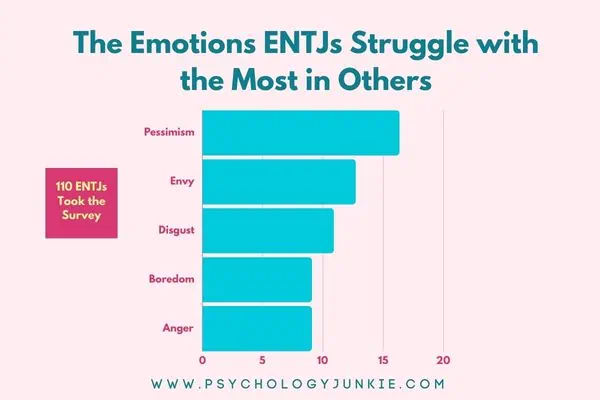
ENTJs can’t stand getting stuck in negativity, so it’s no wonder pessimism topped their list with 16.36% voting for it. ENTJs are visionaries, always looking for the next achievement or breakthrough. Being around people who focus on what’s wrong rather than what can be improved feels like an energy drain. They’re all about pushing forward, not dwelling on setbacks.
Envy came in next at 12.73%. ENTJs are competitive, but they don’t like wasting time eyeing others’ possessions. They enjoy the journey to getting what they want, even though the outcome is always in their mind’s eye.
Then there’s disgust, at 10.91%. I’m definitely curious why this scored so high for ENTJs. When I asked one ENTJ I know personally, he said, “There’s just no point in it. Usually disgust comes with a heaping side of judgment, and that usually means another side of self-righteousness. We’re simply not interested in that.”
ENFJ – Pessimism, Anger, Pride
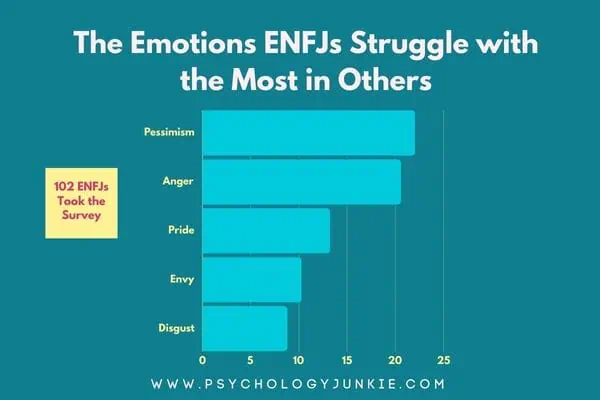
Pessimism tops the list for ENFJs, with 22.06% naming it a struggle. Known for their warm, encouraging nature, ENFJs tend to inspire others, lifting them out of their own doubts. When people around them get caught up in negativity, ENFJs tend to feel agitated and annoyed. “I’m a forward-thinker, I hate getting stuck on what went wrong before or ruminating about the past. Let’s make it better!” one ENFJ noted.
Anger comes in close behind at 20.59%. As Extraverted Feeling types, ENFJs work hard to create an atmosphere of warmth and connection all around them. Anger feels like the bad-mannered sibling who keeps disrupting Thanksgiving dinner. While they’ll try to understand and help, prolonged anger can feel draining and may even cause them to lose respect for someone.
Pride comes in third at 13.24%. ENFJs are naturally empathetic and often downplay their own achievements in order to make others feel comfortable. When someone constantly seeks the spotlight or seems overly self-impressed, it can feel shallow, phony, or selfish. They’d rather everyone feel included than have someone take center stage.
ISTP -Anxiety, Anger, Pessimism
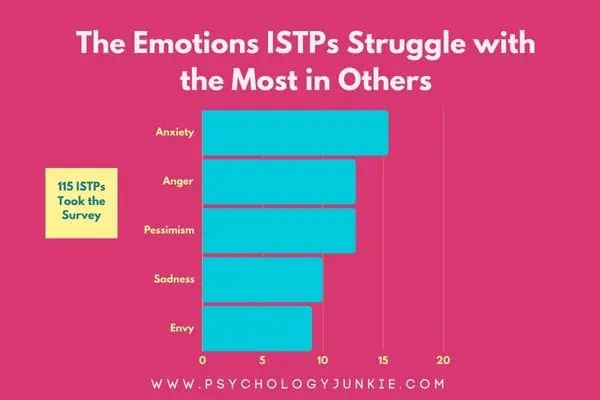
For ISTPs, anxiety ranks as the most challenging emotion in others, with 15.45% listing it as difficult to deal with. This doesn’t mean ISTPs never worry, but they may not know how to emotionally comfort another person who’s in an anxious state. I approach everything with such a logical outlook,” one ISTP commented, “and I think most of what people worry about is a complete waste of time and energy. So my way of trying to ‘help’ is to point that out. As you can guess, that does not go over well.”
Anger follows closely at 12.73%. ISTPs are usually calm and reserved, so they find loud or dramatic anger unnecessary and even distracting.
Pessimism also received 12.73% of the votes. ISTPs are realists, but they prefer to deal with issues as they come rather than dwell on worst-case scenarios. Persistent negativity feels like an obstacle to making things happen, so they tend to step away when pessimism gets in the way of constructive thinking.
ISFP – Anger, Pessimism, Disgust
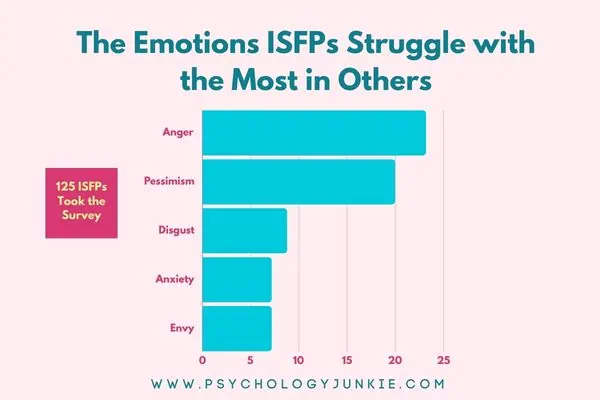
Anger tops the list for ISFPs, with 23.2% marking it as a tough emotion. “I avoid conflict,” one ISFP stated, “but I’m also like a pressure cooker. I hold everything in until it explodes.” Another stated, “I’ve got no patience for screaming, out-of-control anger. I want to, because I want to accept the other person’s authentic feelings, but so often it just becomes needlessly hurtful.”
Pessimism comes in next, with 20% of ISFPs naming it as difficult. Complaining on occasion is okay, but being someone who consistently sees the negative in everything will drain on their nerves. These types like to see the beauty in every moment, even though they also have their negative moods at times. But looking for that glimmer of possibility or joy is essential.
Disgust rounds out their list at 8.8%. ISFPs tend to have a live-and-let live approach to life, so they’re often turned off by outright responses of disgust or judgment.
Discover more about ISFPs: Are ISFP Personalities Rare?
ESTP – Anxiety, Pessimism, Sadness
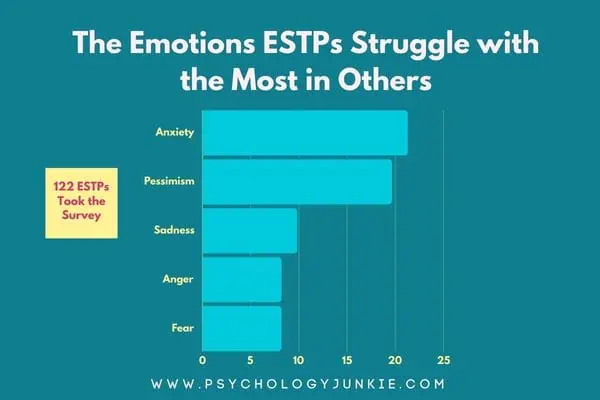
Anxiety takes the lead for ESTPs, with 21.31% listing it as challenging. ESTPs are action-oriented and daring, and they like people who are willing to join them on an adventure! In turn, they find worrying to be unproductive. When others are anxious, ESTPs may try to inject humor or suggest solutions, but ongoing anxiety can feel frustrating to them, as they’d rather just jump in and tackle the issue head-on.
Pessimism follows closely at 19.67%. ESTPs are generally optimistic and focused on what’s happening in the here and now. They see life as an exciting challenge, so when people around them get caught up in negativity, it can feel counterproductive and irritating.
Sadness comes in third, with 9.84% marking it as difficult. ESTPs like to keep things high-energy and upbeat, so they may struggle when someone is feeling down for an extended period. They’ll often try to lift others’ spirits, but persistent sadness can make them feel out of their depth.
ESFP – Anger, Pessimism, Envy
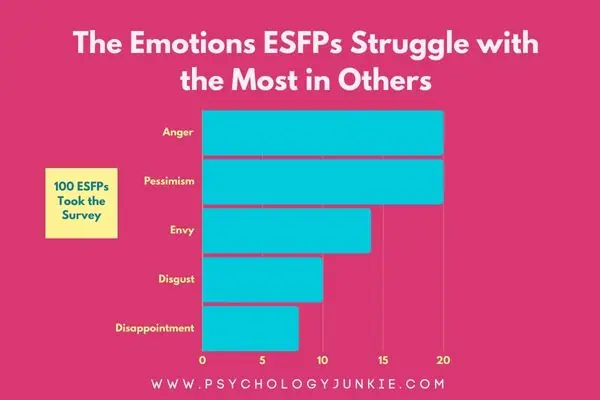
For ESFPs, anger and pessimism are tied at 20%, both emotions being difficult for them to handle. ESFPs are the types who like to lift the mood, get everyone involved, and create an atmosphere that’s full of excitement and a buzz of connection. While they can get angry (I’ve certainly seen an angry ESFP before), they don’t particularly like dealing with it in others. Several ESFPs mentioned a caveat though. “Anger is only okay with me as long as it’s against injustice or cruelty, otherwise I find it overwhelming.” Another said, “I actually have a bad temper and can get pretty intense when angered, but that doesn’t mean I like it.”
Pessimism is equally tough because ESFPs prefer to focus on possibilities and stay open to new experiences. Endless negativity just doesn’t fit their natural outlook, and they quickly grow weary of prolonged moping.
Envy came in third, with 14%. ESFPs are all about enjoying the now and looking for opportunities in the present. In contrast, envy tends to feel like ignoring the opportunities available and fixating on something you can’t have, which seems counterproductive to many ESFPs.
INTP – Anger, Anxiety, Envy
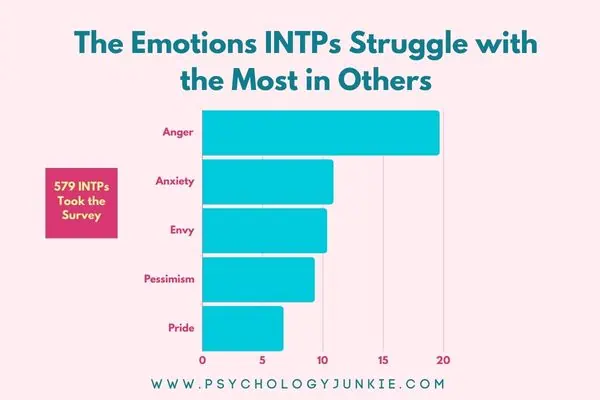
For INTPs, anger was voted most challenging at 19.69%. INTPs tend to stay cool and analytical, so they find emotional outbursts confusing and unnecessary. When others are angry, INTPs often withdraw, trying to analyze the cause rather than get caught up in the emotion itself. That said, they are deeply affected by others’ moods, even if they try to detach from them, and anger can be deeply stressful for them.
Anxiety follows at 10.88%. While INTPs understand worry, and can even struggle with it themselves, they can find being around it draining over time. When they go through anxiety they try to find logical solutions, but often others are seeking something more emotionally demonstrative. This can create a lot of pressure for the INTP to work out their Extraverted Feeling side, which can feel awkward and stressful at times.
Envy comes in third at 10.36%. INTPs are usually focused on their own internal growth, so they see envy as counterproductive. They prefer to focus on knowledge and discovery rather than comparisons, and when others dwell on envy, it can feel superficial to them.
Find out more about INTPs: The Dark Side of the INTP Personality Type
INFP – Anger, Pessimism, Envy
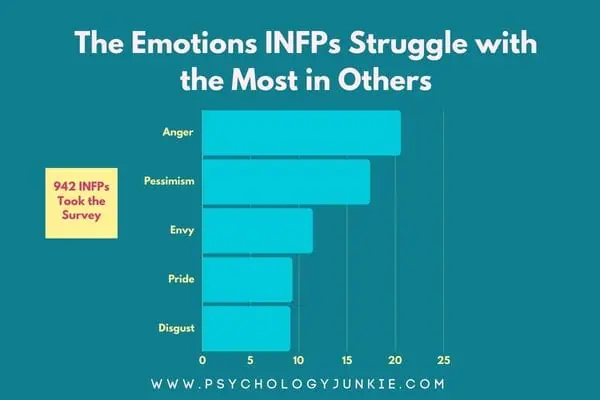
Anger tops the list for INFPs, with 20.59% voting it as a difficult emotion to handle. INFPs try to create an inner sense of peace and tranquility, and anger feels like someone barging in on all of that and setting everything on fire. They’re sensitive to emotional tension and may take anger as a personal attack, even if it isn’t directed at them.
Pessimism follows closely at 17.41%. INFPs are idealistic and often hold a vision of what could be, so constant negativity can feel discouraging. They prefer to focus on what could be improved rather than what’s lacking, and persistent pessimism can make them feel overwhelmed, discouraged, or agitated.
Envy came in third with 11.46%. They want to celebrate uniqueness rather than compare, so envy in others can feel superficial or unfulfilling to them. That said, INFPs aren’t immune to the occasional bout of envy. I feel envious plenty of times,” one INFP commented, “and maybe it annoys me in other people because I see some of myself in it.” Another INFP commented, “I think everyone feels envious, it’s about how much you’re going to let it dominate your life. Some people let it control them and it’s sad to be around.”
Find out more about INFPs: Two Inspiring Morning Routines for INFPs
ENTP – Pessimism, Anger, Anxiety
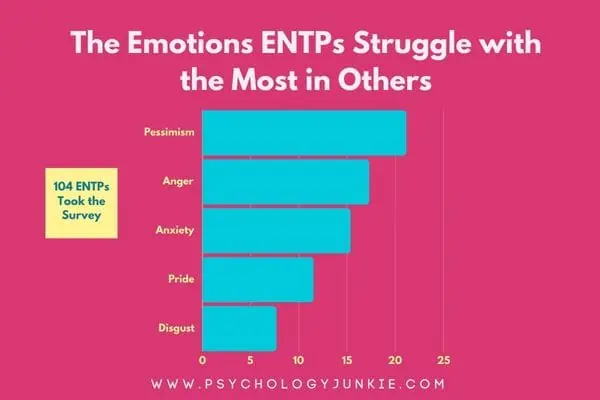
For ENTPs, pessimism is the biggest frustration, with 21.15% marking it as challenging. ENTPs are curious and forward-thinking, always looking for new ideas, so they find it hard to be around people who are constantly focusing on what’s wrong.
Anger comes in at 17.31%. ENTPs enjoy intellectual debate, but they shy away from emotional conflict. Anger feels unproductive to them, so they may try to diffuse tension with humor or logic, finding it uncomfortable when emotions run high.
Anxiety is next at 15.38%. ENTPs prefer action and novelty, so they often struggle with worrying, especially when it prevents people from trying new things. They’ll encourage others to dive into possibilities rather than get bogged down by worry.
ENFP – Pessimism, Anger, Envy
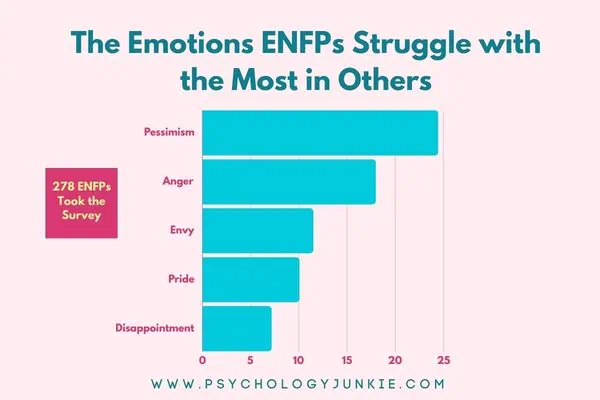
Pessimism is especially tough for ENFPs, with 24.46% marking it as challenging. ENFPs are optimistic and curious, always looking for new possibilities. When people dwell on the negative, it feels completely counterproductive to them. I don’t get pessimism and I know I should,” one ENFP commented, “I like to be accepting of all emotional experiences. But at the same time, it’s so defeating and limiting, and that’s just not what I’m about.”
Anger came in second with 17.99%. ENFPs are the types who try to create a good mood, get people excited, and working together towards a new possibility. Anger, in contrast, feels unsettling. But this doesn’t mean ENFPs never get angry. One ENFP commented, “I get pretty angry sometimes, but I’ve learned a lot about handling it in a healthy way. For instance, I’ve learned that we are more certain of our “rightness” when we’re angry, so we get self-righteous and over-confident in our viewpoint. So yeah. I try to cool down before I just blow up at someone.”
Envy came in third at 11.51%. “I think we all get envious sometimes,” one ENFP commented, “but people who are just constantly comparing and feeling sorry for themselves are too much for me.”
What Do You Think?
Which emotions are the hardest for you to deal with? Do you align with others of your type or do you have a different perspective? Let us and other readers know in the comments! Find out more about your personality type in our eBooks, Discovering You: Unlocking the Power of Personality Type, The INFJ – Understanding the Mystic, The INTJ – Understanding the Strategist, and The INFP – Understanding the Dreamer. You can also connect with me via Facebook, Instagram, or Twitter!

Subscribe to Our Newsletter

Want to discover more about personality type? Get the inside scoop with Susan Storm on all things typological, along with special subscriber freebies, and discounts on new eBooks and courses! Join our newsletter today!



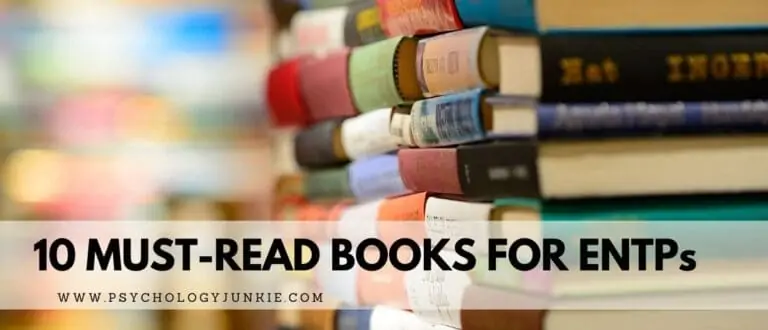
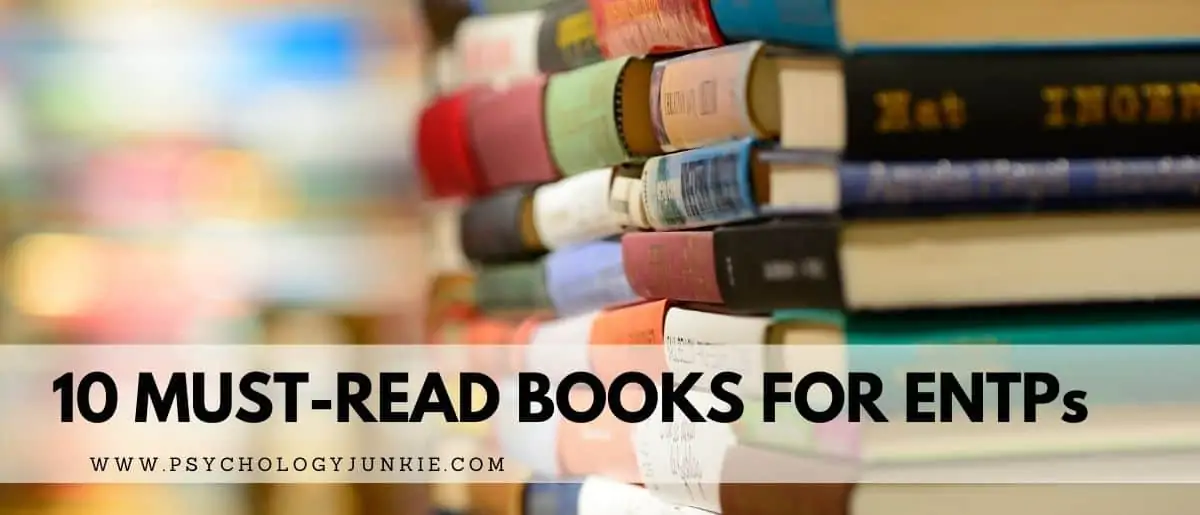
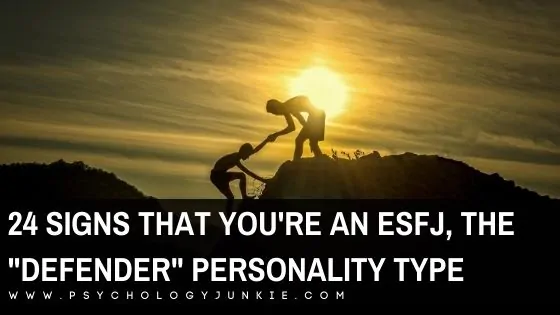


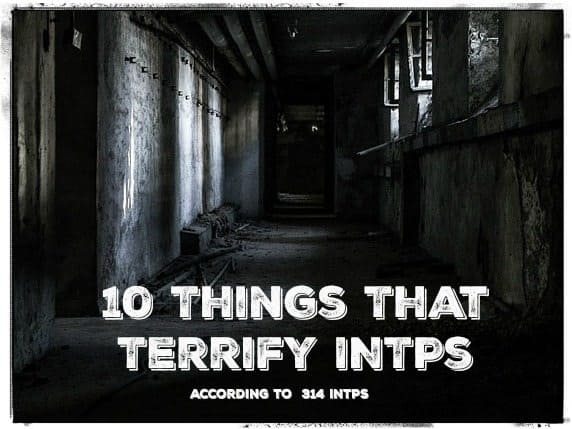
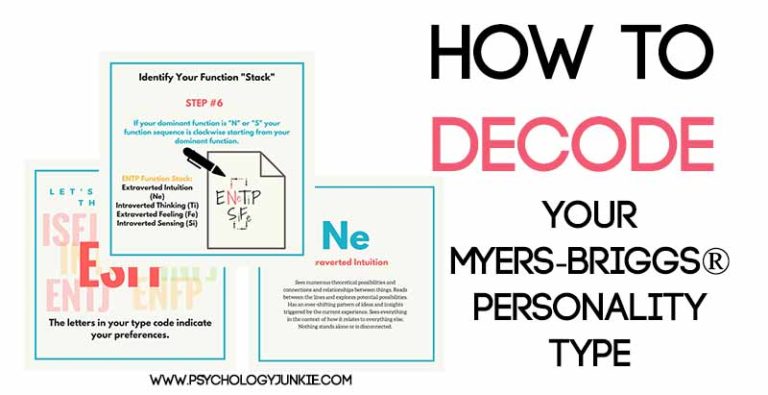
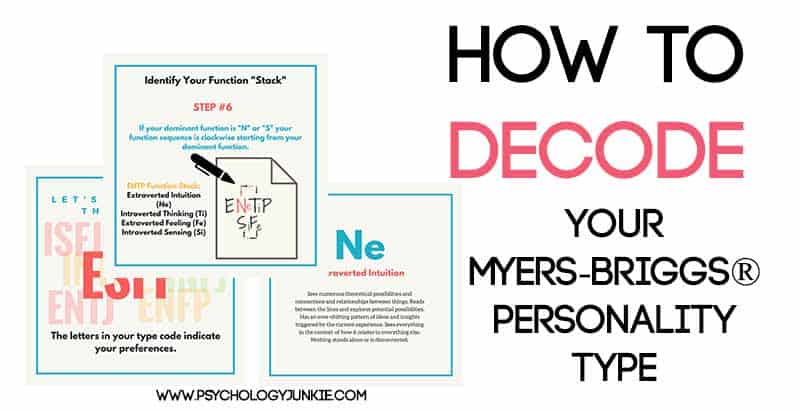
I’d love to see the full results of the survey, not just the top 5 emotions, because emotions I want to avoid aren’t listed in the top 5.
Thanks Ms. Storm, anxiety, anger and pessimism was spot on for me as someone who prefers ISTP! I was curious though, the way you write these seems how we may see that in others. For me, I notice the anxiety in myself as well. I think it may be because I also prefer 5w6 in the enneagram system. Keep up the excellent work!